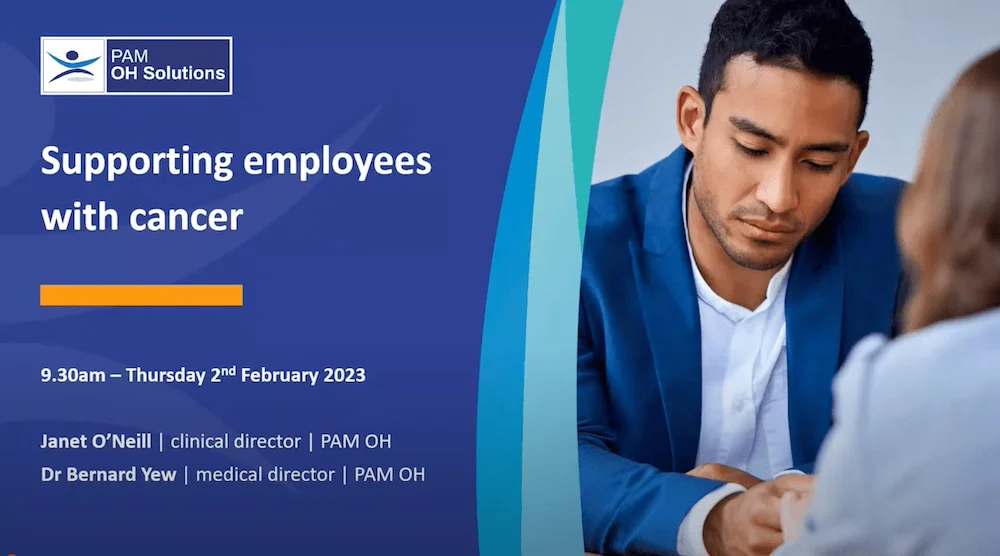
How to support an employee who has survived cancer
Managers have a vital role to play when it comes to helping cancer survivors return to work and rebuild a new normal.
Although one in two people are now affected by cancer during their lifetime, cancer survival rates are increasing, with half of those affected expected to live for ten years or more.
This means supporting cancer survivors to return to work is becoming increasingly important, with many employees requiring help to deal with the emotional and physical toll of treatment.
Managers have a key role to play, so this National Cancer Survivor Month (June) we share our top five tips for supporting those affected to return to work.
Find out what matters to the employee
Surviving cancer is a life changing experience that will affect different people in different ways. Some will find comfort in getting back to their previous routine as soon as possible, others will be ready to prioritise different things. They may want to scale back work to spend more time with family or learn new skills and progress their career in a new direction.
Only by talking to the employee about how they’re feeling can you get a sense of what’s changed for them and what they want to prioritise going forward. They may also have some longer term implications following their illness, such as not being able to physically go back to their previous working arrangements, that need to be understood.
Instead of waiting for the employee to return before discussing these issues, start the process of discussing their return at least 3-4 weeks before they’re due to come back. Encourage their manager to find out what matters to them now, how they’re feeling and what they think they might need support with.
Give managers the confidence to listen
It can be daunting for managers to talk to someone who has been going through cancer treatment if the communication channels haven’t been kept open. They might not know what to say and be afraid to ask about their cancer experience, for fear of seeming intrusive.
This can sometimes lead to managers just launching into talk about work with the employee, which can come across as brushing their experience aside. It’s therefore important to give managers the confidence to talk to employees about what they’ve been going through.
This requires encouraging managers to actively listen and be comfortable with silence, showing empathy and understanding. This allows the employee to think and process their thoughts so the manager can get the insights needed to support them. Whilst it can be tempting and sometimes supportive to share personal insight if the Manager has had similar experiences, it’s important to ensure the conversation remains focused upon the employee.
Phase the employees return to work
It’s vital that when returning to work, cancer survivors have a positive experience. The first week back can often be overwhelming and exhausting, creating a negative feeling that they failed. Or cause them to question if they should have come back at all.
Instead, it’s much better to start slowly and build up to ensure positive progress, supporting their confidence and feeling of achievement. If they want to start back on full days, it can be helpful to suggest a slightly slower pace, suggesting shorter days or a break day. This can be increased weekly to achieve the desired working pattern
An occupational health assessment can help to identify what symptoms they might still be struggling with, such as fatigue or muscle weakness, and provide reasonable recommendations for a phased return to help them readjust to working again.
Provide emotional support
Cancer survivors can struggle with issues ranging from trauma, following not knowing if they were going to survive, to anxiety about feeling like they let colleagues or customers down while they were absent.
It can be very helpful to support the employee to meet with colleagues, by dipping into work for a social event or coffee, both during their absence but most beneficially before they return to work. Not only will this get the employee back over the threshold, but re-engaging with colleagues, prior to their first official day back at work, means reconnecting with others and those first conversations become one less concern.
For individuals who are still struggling with feelings or anxiety linked to navigating their return, or the emotional toll of going through cancer, it can also be useful for them to have some counselling, via the company’s Employee Assistance Programme (EAP) or their GP.
Keep the conversation going
Once the employee is back to work, it’s important to keep the conversation going. How are they feeling, are they being given too much, not enough, what’s the communication been like for them, what are they finding difficult and what’s working well?
Ideally, they should be having weekly check-ins with their manager to discuss the above, and not just work projects or deadlines. It can also be useful to put the employee in touch with any support groups within the organisation or assign a Buddy if they don’t feel able to talk openly with their manager or would just welcome some peer support.
It’s also important to bear in mind that the employee will have good and bad weeks and their recovery might not progress in a linear progression. Only by making them feel safe to take off their ‘I’m fine’ mask and admit how they’re really feeling, can you provide them with the ongoing support needed to fully recover.
Free Webinar: Supporting employees with cancer

How can PAM Group help?
We can support cancer survivors to return to work in the following ways:
Occupational Health Assessments – clinical assessments to understand how someone’s condition is impacting their ability to work with recommendations for phased reasonable adjustments to help them return to work and gradually build up their duties.
Psychological Services – round the clock employee assistance programme (EAP) to provide employees with emotional support and access to counselling. Plus advanced trauma therapy, depending on their needs.
Physiotherapy – to help employees to regain conditioning and manage musculoskeletal (MSK) issues, following cancer treatment or prolonged periods of inactivity due to ill health or time off work.
To find out more, please visit pamgroup.co.uk or email info@pamgroup.co.uk
Related Insights
Keep Britain Working and the end of reactive absence management
Five wellbeing challenges employers will need to tackle in 2026
Flu season is coming early – is your workplace ready?
Occupational health insights on keeping your people healthy and productive
Want to have our latest research, case studies and opinions
delivered straight to your inbox?





